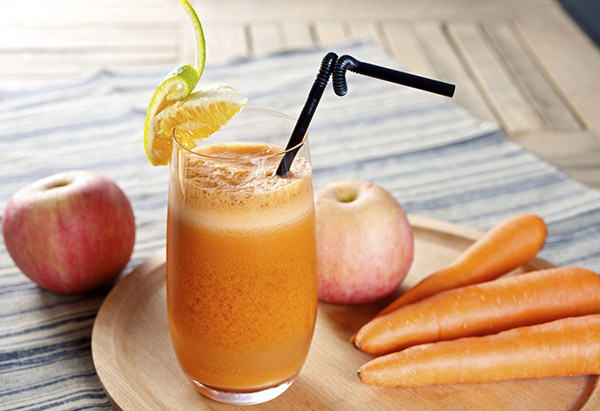The Healing Properties of Juicing
Add variety to your diet while getting the nutrients you need.

Photo: Thinkstock
There are many health benefits of drinking fresh juice, and it's a great way to get nutrients from fruits or vegetables that your diet may be lacking. Juices retain most of of the vitamins, minerals and plant chemicals (phytonutrients) that would be found in the whole versions of fruit or vegetables. These nutrients can help protect against cardiovascular disease, cancer and various inflammatory diseases, like rheumatoid arthritis. Valuable compounds called flavonoids and anthocyanins are abundant in a variety of fruits and vegetables and guard against oxidative cellular damage, which comes from everyday cellular maintenance and is exacerbated by exposure to chemicals and pollution.
Juicing typically requires using a machine or equipment that has the power to turn raw fruits and vegetables into liquid. Home juicing machines may cost anywhere from $30 dollars to more than $300 dollars. By using special blades, most juicers chop fruits or vegetables into tiny pieces and spin them to separate the juice from the pulp, which eliminates the majority of the fiber. You can ask around at local stores or consult Consumer Reports to find the juicer that's best for you.
However, beware of claims that juicing is the only way to stay healthy, that you should avoid eating solid foods, or that juicing is a substitution for a medical diagnosis or treatment. There's not much research that proves that consuming juice is healthier than eating whole fruits and vegetables; juicing just makes them easier to consume on a regular basis.
While some juice fans claim that your body absorbs less nutrients from whole fruit than from liquid because the fiber gets in the way, there isn't much research to support this. Your digestive system is actually designed to handle fiber and extract nutrients from a variety of foods. Plus, fiber is important for digestive function and has a multitude of health benefits.
Next: The risks of juicing at home—and how to avoid them
Juicing typically requires using a machine or equipment that has the power to turn raw fruits and vegetables into liquid. Home juicing machines may cost anywhere from $30 dollars to more than $300 dollars. By using special blades, most juicers chop fruits or vegetables into tiny pieces and spin them to separate the juice from the pulp, which eliminates the majority of the fiber. You can ask around at local stores or consult Consumer Reports to find the juicer that's best for you.
However, beware of claims that juicing is the only way to stay healthy, that you should avoid eating solid foods, or that juicing is a substitution for a medical diagnosis or treatment. There's not much research that proves that consuming juice is healthier than eating whole fruits and vegetables; juicing just makes them easier to consume on a regular basis.
While some juice fans claim that your body absorbs less nutrients from whole fruit than from liquid because the fiber gets in the way, there isn't much research to support this. Your digestive system is actually designed to handle fiber and extract nutrients from a variety of foods. Plus, fiber is important for digestive function and has a multitude of health benefits.
Next: The risks of juicing at home—and how to avoid them
Safe Juicing
When juicing at home, make only as much as you can consume at one time. Juice that sits for a period of time can harbor bacteria and cause food poisoning. What's more, exposing the drink to air, bacteria and other pathogens can not only make you sick but threaten the nutritional value of the juice.
E. coli is a very dangerous bacteria that can live on your fruit and vegetables and make you sick. The problem is that it can only be killed with heat, which has the side effect of damaging the nutritional content of the juice. Always wash produce thoroughly to remove any dirt, pesticides or bacteria, and make sure your cutting board and utensils are clean. (You could also boil your juice on the stove).
If you decide to pursue a diet that consists predominantly of juice (i.e., you want to try a juice cleanse) aim for at least 2000 calories (or more) per day, depending on your metabolic needs. It's key for your health that your body receives a sufficient amount of calories, vitamins, nutrients, protein, fat and carbohydrates. Also, make sure you're getting enough fiber to keep your digestive system working smoothly. You can add dissolvable fiber powder to your juices or supplement with fiber-rich solid foods like prunes or pears.
More Ways to Eat Smart



